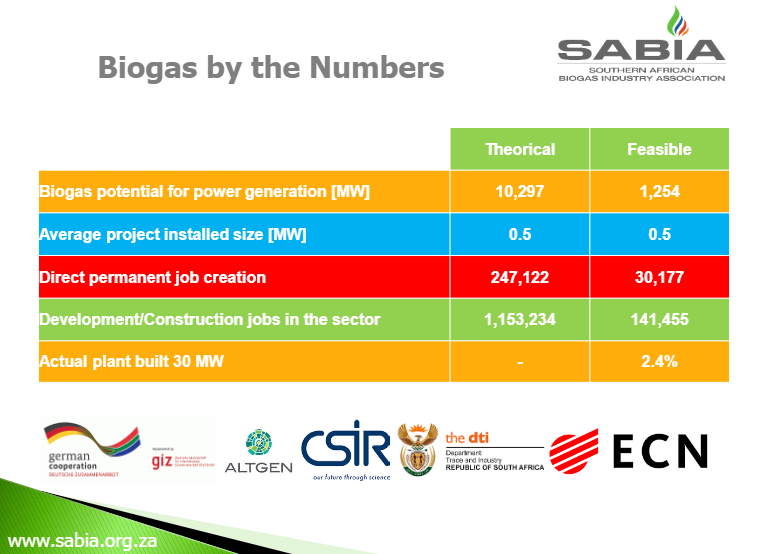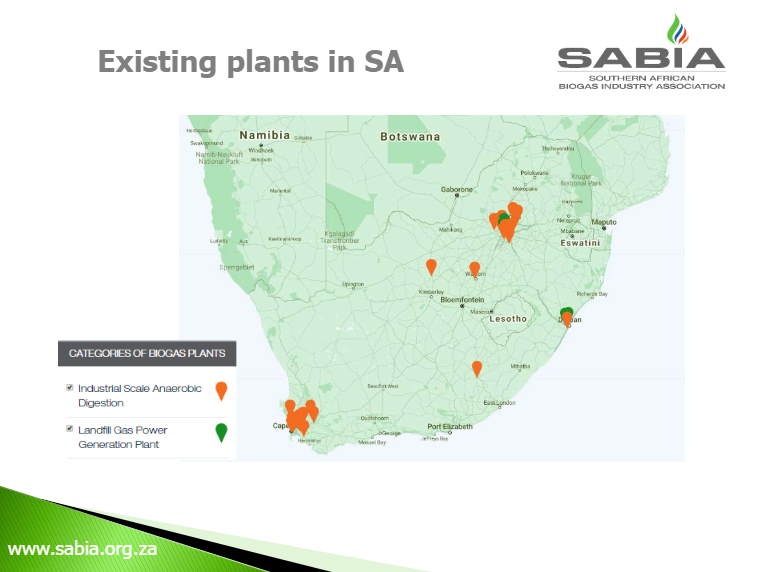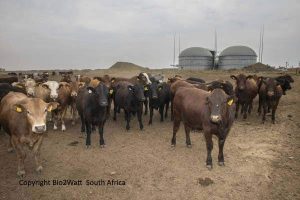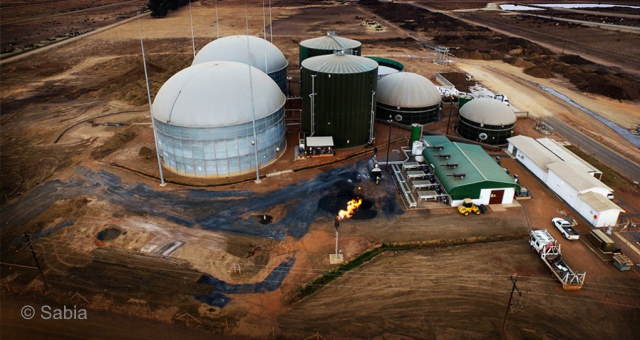The adoption of Anaerobic Digestion in South Africa is at an early stage in what will be a large and productive local industry if developed to even a small proportion of its full potential. For anyone familiar with the country it must be undeniable that they have large untapped renewable resources in all forms of renewable energy. The only clear exception is hydro-power in such a dry country.
While transforming organic waste into valuable resources such as biogas and biofertilizer, this technology can provide renewable energy, reduce greenhouse gas emissions, and improve soil health. With increasing awareness of the benefits of anaerobic digestion and biogas, South Africa has been making significant progress in this field, with several new projects and initiatives underway.
What the 2023 Tax Amendments Potentially Mean for Biogas in South Africa
The 2023 budget in South Africa introduced two renewable energy tax incentives that have the potential to significantly impact the funding of anaerobic digestion and biogas plants in the country.
Of the two incentives announced, the expansion of “The Enhanced Renewable Energy Tax Incentive” holds particular promise for the biogas industry in South Africa.
If passed by the government, taxpayers conducting businesses will be eligible for a 125% tax deduction in the first year for qualifying capital expenditure related to renewable energy projects. Importantly, there will be no threshold on generation capacity, meaning both small and large-scale projects can benefit from this incentive.
We understand that if passed by the government the enhanced tax incentive is set to be available for a two-year period, applying to investments in renewable energy projects that are put into operation for the first time between March 1, 2023, and March 1, 2025. These proposed amendments aim to address the country's energy crisis by encouraging private investment in expanding electricity generation.
Potential Impact on the South African Biogas Industry
If this amendment is enacted as it stands, it could provide a significant boost to the biogas industry in South Africa.
Commercial-sized projects that have been awaiting favourable conditions could finally find the financial viability they need to move forward. However, it's important to note that the timeline is tight, with the first public comments closing in July 2023 and the amendment itself concluding in March 2025.
If implemented, this incentive could provide a much-needed impetus for the growth and development of biogas plants across the country. SABIA (South African Biogas Industry Association) is committed to advocating for the industry's interests and will closely monitor the progress of the proposed amendments.
It is an exciting time for the biogas sector in South Africa, and we eagerly await further updates on this front.
ANAEROBIC DIGESTION AND BIOGAS TECHNOLOGY IN SOUTH AFRICA
Anaerobic digestion is a process by which organic waste is broken down in the absence of oxygen. This process produces biogas, which is a mixture of methane and carbon dioxide, along with a nutrient-rich biofertilizer. Biogas produced in this way can be used for electricity generation or as cooking fuel.
In recent years, South Africa has seen a growing interest in anaerobic digestion and biogas technology, with a number of new projects and initiatives underway. One example of this is a biogas plant in Buffalo City, which is one of the largest of its kind in South Africa. The plant processes agricultural waste into biogas, which is used to generate electricity for the local grid.
BENEFITS OF ANAEROBIC DIGESTION AND BIOGAS TECHNOLOGY
There are numerous benefits to using anaerobic digestion and biogas technology in South Africa. First and foremost, this technology can help to provide a reliable source of renewable energy that can be used to power homes and businesses. By converting organic waste into biogas, this technology also helps to reduce greenhouse gas emissions and waste disposal costs.
Additionally, the nutrient-rich biofertilizer produced by anaerobic digestion can be used to improve soil health, which is crucial for agriculture in South Africa. By utilizing this biofertilizer, farmers can reduce their reliance on chemical fertilizers and improve the quality of their crops.
SOUTH AFRICAN CHALLENGES AND OPPORTUNITIES
While there are many opportunities associated with anaerobic digestion and biogas technology in South Africa, there are also several challenges that need to be addressed. One of the biggest challenges is the lack of awareness and understanding of this technology among farmers and other stakeholders.
To address this challenge, the South African government is investing in education and outreach efforts to promote the benefits of anaerobic digestion and biogas. Additionally, there is a need for more investment in research and development to improve the efficiency and cost-effectiveness of this technology.
CONCLUSION: Anaerobic Digestion in South Africa
Anaerobic digestion and biogas technology have the potential to address a number of pressing environmental and economic challenges in South Africa. With increasing awareness of the benefits of this technology, there is a growing interest in developing new projects and initiatives that can help to promote sustainable development in the country. By investing in this technology, South Africa can reduce its dependence on fossil fuels and promote a more sustainable future for all.
Archive content posted on 7 July 2020 follows:
Recently the reporter Halima Frost got together with the Secretary of the national trade body for the biogas industry, and wrote the following analysis of the potential for anaerobic digestion and biogas in South Africa:
The following article is republished with permission from Creamer Media's Engineering News:
Twofold benefits of investment in biofuels
The South African biogas sector can attract up to R250-billion in local and international investment and contribute to a 15% reduction in the total greenhouse gas emissions generated by the country, says Southern African Biogas Industry Association (Sabia) general secretary Alberto Borello.
“The local biogas sector in 2020 includes 30 industrial-scale biogas plants and about 300 micro digesters, with the potential to establish 2,400 industrial biogas plants by 2030.”
Currently, the installation of 1,250 MW may be financially viable and can contribute to the creation of 30,000 permanent jobs and 142,000 temporary jobs.
Speaking at the inaugural World Biogas eFestival, hosted online by the World Biogas Association (WBA), last month, Borello said the amount of organic waste that South Africa is collecting and disposing to landfills could easily be converted into biogas and generate more than 10 GW of power.
He pointed out that biogas plants are the best solution for the organic waste management crisis.
Sabia promotes the production of biogas through the installation of biogas technologies at agri-industry processing facilities, urban wastewater treatment plants, and livestock farms.

Borello further highlighted Sabia’s strategic vision, which includes the complete banning of organic and/or food waste entering a landfill site, consequently resulting in the introduction of separate organic waste collection for treatment at biogas facilities across South Africa.
He also discussed the recent ban on the disposal of organic liquid into landfills and the implementation of a separate collection for organic by-products in the major urban areas. This will then necessitate the construction of plants to process the organic liquid and transform municipal organic waste into a resource.
Sabia also hopes to set targets for the recycling of biodegradable wastes and feedstocks, as well as promote the development, support, and creation of its payment for ecosystem services tariff to stimulate the recovery of organic residues.
Borello pointed out that, in the past five years, Sabia worked very closely with public institutions to expedite the implementation of the legislation for the reuse of the organic waste available since 2016, the development of environmental norms and standards for biogas projects, as well as the exclusion of biogas plants from the air-emission licence.
Global Presence
Borello has been selected to serve as a member of the newly formed World Biogas Association (WBA) Council, announced in the UK last month.
He enthuses that this is an opportunity to be a change agent in the biogas industry for South Africa. “I am extremely honoured to serve on the WBA Council on behalf of Sabia.”
Being part of the WBA Council will increase the cooperation between the two organisations, with reciprocal benefits.
The role of the council will be to help provide a strategic vision for the WBA’s activities and to help clarify the major barriers to achieving the 12% reduction in greenhouse-gas emissions by 2030 goal, according to the Paris Agreement on climate change.
The council hopes to achieve this by providing guidance on how to overcome those barriers in a way that will support the development of the biogas sector globally.
Further, the council hopes to aid in the creation of alliances and partnerships for the association and its members, as well as feeding into the association’s reports and publications.
Borello says Sabia and the WBA have worked closely over the past two years to achieve important goals in terms of the promotion of the biogas sector.
Sabia will continue to have access to studies, resources and reports, and gain insight from the lessons learned by countries that have successfully developed biogas sectors.
The WBA, in turn, will continue to have access to not only information regarding biogas policy development but also eventual business opportunities in South Africa, with assistance from Sabia.
— End of Engineering News Article —

South African Biogas Potential Is Very Similar To Most Nations
The evidence is in and the global perspective is: Renewable energy is viable, reliable, and ready to go – all that’s missing is the political will to kick-start an energy revolution in South Africa.
An eloquent article by Greenpeace said it all, back in 2016, and we quote:
Right now, renewable energy is actually already cheaper than coal and nuclear power at every step.
- A unit of electricity from Eskom’s new coal plants cost about R0,80/kWh, from nuclear R1,00/kWh while a unit of electricity from solar photovoltaic cost R0,80/kWh and from wind only R0,60/kWh.
- In addition, there are no input costs for wind and solar energy [and the anaerobic digestion of waste biomass]. So for example, while one needs to buy coal for a coal-fired power plant to generate electricity (and coal mining itself has massive environmental costs), solar and wind energy don’t have input costs like that – sunlight and wind are free.
- Besides, the Greenpeace (SA) report shows that there could be about 7.6 million jobs in Africa by 2020 in the renewable energy sector and about 10 million by 2030. via Renewable Energy Myths (as recently archived)
First Posted on 12 May 2018:
SA Falling Behind on Renewable Energy
May 2018: South Africa is falling behind on renewable energy project implementation, even as other nations accelerate their plans for green energy.
According to data from Greenbyte, a renewable energy management systems manufacturer, SA lags far behind fellow BRICS country China which has 188 232MW (megawatts) of wind power capacity and 106 921MW of solar energy capacity.
SA has just 2,094MW of wind and 1,450MW of solar capacity.
Environmental activist organisation Greenpeace said the problem with the low take-up of Anaerobic Digestion in South Africa lay with renewable energy policy implementation.
“We have been stuck in a black hole for over two years while Eskom refused to sign the power purchase agreements for the recently approved 27 renewable energy independent power producer (IPP) projects, which has created massive policy uncertainty in the renewable energy space,”
said Nhlanhla Sibisi, Greenpeace Africa Climate and Energy campaigner for Anaerobic Digestion in South Africa.
“The utility was effectively holding the country to ransom, and national government did not intervene to ensure that the renewable energy projects went ahead. Added to this, the lack of an incentivising framework for rooftop solar and Eskom's own lack of investment in renewable energy have created a significant under-investment in renewable energy,”
Sibisi said.
The following are excerpts from other (older) news items about Anaerobic Digestion in South Africa:
Behind-the-scenes look at the BMW Bio2Watt biogas plant (in 2015)
 BMW South Africa recently announced it had started using green energy at its Rosslyn plant in Pretoria.
BMW South Africa recently announced it had started using green energy at its Rosslyn plant in Pretoria.
The announcement followed an agreement with Bio2Watt, enabling BMW’s Rosslyn plant to receive 25% to 30% of its electricity requirements from renewable sources.
The BMW South Africa/Bio2Watt renewable energy partnership is the first commercially-viable biogas project in SA.
The Bio2Watt biogas plant in Bronkhorstspruit is located on the premises of one of South Africa’s larger feedlots – Beefcor.
The location provides the project with proximity to key fuel supplies; grid access; and a sufficient water supply from Beefcor’s stormwater collection dams.
The biogas process relies on organic waste, which is directed into a digester where biogas is produced. This gas is then used to produce electricity, which is inserted into the power grid for uptake by power purchasers like BMW.
At the Bronkhorstspruit biogas plant, about 40,000 tons of cattle manure and 20,000 tons of mixed organic waste are fed annually into two anaerobic digesters that produce biogas.
The Bio2Watt plant in Bronkhorstpruit has the capacity to generate 4.4MW, and Bio2Watt [said in 2015 that it was] establishing more anaerobic digestion projects in South Africa. via BehindBMWBio2Watt
The relatively low number of anaerobic digestion facilities in South Africa is even more surprising when you consider the quality of the locally available training, as provided in the video below:
South African Biogas Basics – Presentation by Mark Tiepelt on Biogas Basics in SA.
Conclusion – South Africa has real bio-energy potential
“South Africa definitely has exploitable bio-energy potential,”
stated Council for Scientific and Industrial Research principal engineer Crescent Mushwana at the launch of the South Africa Bio-energy Atlas in Pretoria.
“Bio-energy is feasible from organic waste, residues from forestry and agriculture [lignocellulose], and eradication of alien invasive plants.”
“These all amount to ‘low-hanging fruits‘. ”
“The economic viability of biofuels from purposely cultivated crops is currently negatively affected by the low price of oil.”
Organic wastes are turned into biogas using simple devices called digesters.
Basically, these are air-tight containers in which a biological process called anaerobic digestion takes place. Ideally, the temperature has to be controlled for optimal efficiency. The result is a mixture of methane (the major part) and carbon dioxide gas. The methane can be used as fuel to generate electricity. The residues can be used as fertiliser.
[Anaerobic Digestion in South Africa Page: First published in May 2018. Also updated in July 2020.]






Howzit my china? Hundreds. What Eskom refuses to do. Eskom refuses to do man. Those okes are first going to have a fat indaba about what to braai.
Don’t portray a totally black picture of south Arfican biogas developments. In response to business interest and requests for information, GreenCape has developed a report on the business case for biogas from solid wastes in the Western Cape. The report highlights the current status of biogas in the Western Cape and explores the drivers for financial feasibility.
2017 status was as in the report which showcases 5 of the 21 biogas projects currently in existence or being planned. While the business case is highly site specific some general requirements for success are identified. You may easily be too negative. Thanks for your article.